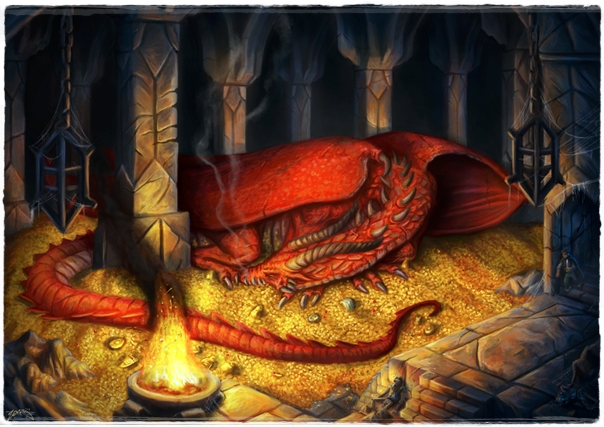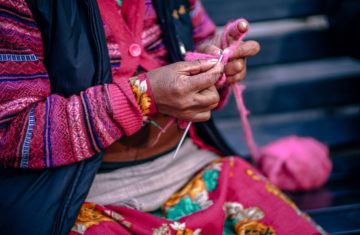In a stroke of serendipity during my month of practicing generosity, it happens to be World Gratitude Day today. Gratitude and generosity are deeply intertwined. As Tara Brach says, gratitude is our in-breath and generosity is our out-breath. To put it another way, gratitude is something we feel and experience, and generosity is the way we put that feeling or experience into action. So generosity is simply impossible without cultivating a grateful heart.
Today, this has me thinking of dragons, specifically of Smaug, the dragon from JRR Tolkien’s The Hobbit.* Smaug was known to be a rather terrible and particularly greedy dragon, so when he discovered that the Dwarves were stashing piles of treasure inside a mountain, Smaug attacked and took over the mountain for himself. He had been there, guarding his loot, for 150 years before Thorin Oakenshield and his friends decided to make a play to get it back, with the help of Bilbo Baggins. What you realize, though, as this journey unfolds, is the waves of anger and resentment and destruction that have come from this ocean of treasure.
The dwarves have allowed this to create so much conflict between themselves. For over a hundred years, they’ve just let this resentment fester. What I’m pondering today is how their resentment and anger is its own form of hoarding. It is a total rejection of gratitude and generosity, because they’ve decided instead to live fully into this story of deprivation. They have been deprived of what is rightfully theirs! And, though this is absolutely true, the level at which they cling to it ends up being so damaging to themselves. They are so focused on what has been taken from them, they forget to embrace the gifts they still have. They just sit there, stuck in the deprivation cycle.
When the journey to reclaim the mountain begins, the price of resentment, envy, and possessiveness becomes clear. They fight amongst themselves frequently. It becomes clear how tightly they’re holding on to notions of who “owns” this treasure and who gets to say what happens with it. There are so many opportunities to move from greed to gratitude, and they walk past them over and over again. And unfortunately, they don’t seem overly generous once the treasure is returned to them. The question left unanswered is whether they will now simply become like Smaug themselves. And if they do, did they journey anywhere at all or just rearrange the same furniture of greed they had before?
And what about Smaug? Here’s what’s heartbreaking about him: he, too, is a prisoner. He has willingly confined himself inside of a mountain for 150 years because he is so terrified of losing his treasure. That is next-level grasping. And what does he have to show for it? He’s a dragon with the ability to soar and travel the world and instead he’s been staring at the same walls for over a century. And in the end, he dies. All of his grasping and attempt at control gets him nothing and nowhere. It’s a sobering morality tale.
Dragons are meant to symbolize courage, strength, and a sense of spiritual power and fortitude. In this way, Smaug died as a dragon unfulfilled. Rather than being a symbol of spiritual power, he became a cautionary tale of greed.
The force of greed, of hoarding, of possessiveness, is potent. And it’s also destructive. It blocks us from being able to practice the simplicity of gratitude, where even the most ordinary thing can be seen as worthy and beautiful. Greed is such empty poverty.
True abundance is the ability to gaze at the world with gratefulness. It is the freedom and joy of walking with open and even empty hands and yet realizing we have all that we need.
Of course, if you’ve read The Lord of the Rings, you know this struggle of human greed will continue in the symbol of the Ring. It takes three more books and an arduous journey to Mordor to realize that real power comes not from seizing but from letting go. Real power is not possession but generosity. There’s a reason Jesus, Buddha, and Ghandi all gave up their power and possessions (and lives) willingly. They understood where real power resides.
Ken McLeod, in his book Reflections on Silver River, suggests a powerfully simple way to free our greedy dragons: practice letting go. Every day, pick an actual physical object and give it to someone. It doesn’t matter what it is. He says it can be a paper clip or a flower. The point is to get over the grasping, that inclination to hoard rather than share. Just practice sharing. McLeod reminds us to be open to whatever emotions we have during this exchange. Just notice them, and see if they shift or move at all over time. The hope is that this practice will create a natural sense of generosity within us.
Imagine what could have happened if the dwarves decided to begin every day by giving away one piece of treasure to someone in need. One piece, every day. It would be such a long story of generosity. And I can only imagine they, too, would be changed in the process.
Within each of us lies a dragon that is capable of both insidious greed and ferociously beautiful spiritual power. Train your dragon well by starting with gratitude and an open heart. Practice having an open hand. Get good at letting go. Take time to appreciate the loveliness of everyday things. Cultivate gratitude, and generosity will come as easily as breath.
This post is part of the Paramita Project. This month I’m practicing generosity, and you can read previous posts here and here.
*In another stroke of serendipity, I just learned this week also happens to be the 81st anniversary of The Hobbit. Thanks, Tolkien!




